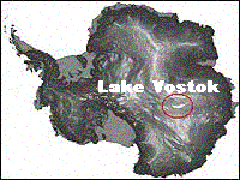 What lurks beneath the dark depths of the Antarctic ice? That almost sounds like the opening line in a bad SiFi story. The thing is it really is a question that scientists are asking about a strange fresh water lake found below the ice in the Antarctic. Let’s take a closer look…
What lurks beneath the dark depths of the Antarctic ice? That almost sounds like the opening line in a bad SiFi story. The thing is it really is a question that scientists are asking about a strange fresh water lake found below the ice in the Antarctic. Let’s take a closer look… In 1957 the Russians established a remote base in 
But 20 years passed before their suspicions were confirmed, when satellites finally revealed that there was an enormous lake under the Vostok base. At just over 6213 square miles it is one of the largest lakes in the world and is about the size of
Biologists believe that because the lake has been cut off from the rest of the planet for 15 million years or more - well before the human race evolved - microbial life in the lake could have quietly been evolving into strange and unique forms. It’s a uniquely hostile environment for life - permanently low temperatures, hundreds of atmospheres of pressure, and no light for photosynthesis. In fact, as NASA has realized, the conditions directly replicate those found on Europa - the icy moon of Jupiter. So finding microbial life in
Who knows but a few years ago, researchers found something that sent shivers through the scientific community: a diverse community of microbial life-forms that live without sunlight or a ready supply of nutrients.
The scientists were not searching deep space when they made their find. Rather, they were sampling the bottom of a 2.5-mile-thick Antarctic ice sheet.
The frozen mass covers
This, in turn, led scientists to suggest that a large, diverse community of microbes lived in the lake itself. If true, the theory would answer questions about the limits of life on Earth and expand the range of environments that might potentially host life-forms in space.
Two independent research teams announced the initial discovery of the Antarctic ice sheet microbes in the 
One study was led by John Priscu, an ecologist with the Department of Land Resources and Environmental Sciences at
Since then the research teams and others have further analyzed the microbes. They've sought to describe the microbes' diversity and to determine whether or not the microbes might actually be contaminants introduced to ice-core samples by the instruments used to gather and study them.
According to Priscu, new data gathered by his team shows that the microbes have diverse physiologies. The data also suggest that
"I believe there are about 10,000 [microbial] cells per milliliter [0.2 teaspoon] in
Karl's team has also conducted further analysis and found that a viable microbe population lives in the Antarctic lake buried under miles of ice. Although Karl noted that "the biomass may be very low."
Other scientists, however, have disputed the initial findings of both research teams, suggesting that it was the instruments used to retrieve and study the ice core samples that were contaminated with microbes—not the bottom layer of the ice sheet.
Punching the through 2.5 miles (4 kilometers) of ice covering
The international scientific community is eager to do so, but nations disagree on how to proceed.
Martin Siegert, a glaciologist in the
Siegert said that developing the appropriate
"We can go into this lake, undertake an analysis of the water, and prove once and for all whether the water and sediments are truly the fascinating environment we think they are," Siegert said. "Once done, we can upscale the next mission, eventually going to Vostok."
Meanwhile, a team of Russian scientists recently announced plans to drill into
"I applaud the Russian program for moving ahead with bold plans, but I would have rather seen it be an international effort with stronger environmental, education, and science programs, all of which are in the spirit of Antarctic research," Priscu said.
So what do I think? I think that
I’m Average Joe


No comments:
Post a Comment